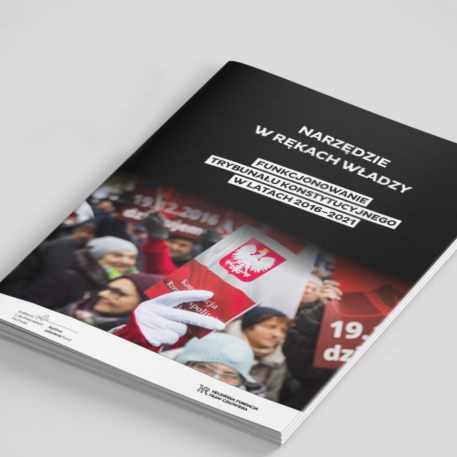
President of the Constitutional Court must provide the Helsinki Foundation with the details of changes in judicial panels, rules a Provincial Administrative Court
A Provincial Administrative Court has ordered the Constitutional Court to provide the Helsinki Foundation for Human Rights with designations of cases examined by a changed composition of judges and those in which the judge rapporteur was appointed in contravention of the requirement of respecting the alphabetical order of appointments. The ruling is the result of an appeal brought by the Foundation in 2021.
Different composition – different decision
The HFHR submitted an access to public information request to the Constitutional Court during the work on the report A tool of the government. The functioning of the Polish Constitutional Court in 2016-2021. The Foundation requested, among other things, official designations (numbers) of cases heard by panels whose compositions changed. Disturbing information on “court-packing” practices originated from open letters of Constitutional Court judges. They pointed to unlawful changes in the composition of the Court’s panels and the resulting interferences with the merits of judgments issued by the Constitutional Court. According to their calculations, in the period from January to April 2017 alone, there were as many as 21 instances of changes to already appointed judicial panels.
The conclusions concerning the appointment of new panels were equally alarming. The judges warned that panels were appointed arbitrarily, in contravention of the requirement of respecting the alphabetical order of appointments. However, the only exception to the alphabetical order rule under the Act on the organisation and procedure before the Constitutional Court applies to the appointment of a judge rapporteur. What is more, this exception may only be invoked “in justified cases”, e.g. because of the subject matter of the case under consideration.
Public information and public interest
The Constitutional Court initially decided that the requested information was not “public information”. The Court changed its view after the HFHR successfully complained about its failure to act to the Provincial Administrative Court in Warsaw. In the new proceedings, the Constitutional Court requested the HFHR to demonstrate that the disclosure of this piece of public information in a processed form is a matter of public interest. However, after receiving the relevant response, it found the HFHR’s explanation insufficient. “The Constitutional Court argued, essentially, that the HFHR was in no way able to use the requested information”, explains Marcin Wolny, a lawyer for the Helsinki Foundation.
An appeal against the restriction of information
The HFHR did not share this view. It appealed to an administrative court complaining about, among other things, an infringement of Article 61 of the Constitution (right to be informed of the actions of authorities) and Article 10 of the Convention for the Protection of Human Rights and Fundamental Freedoms (freedom to receive and impart information). The Provincial Administrative Court in Warsaw upheld the Foundation’s appeal. It pointed out that there was a particular public interest in the disclosure of the requested information. The Court ruled that any restriction on access to public information should be proportionate and based on public interest.
“This is a crucial step towards knowing the behind-the-scenes workings of the Constitutional Court led by President Julia Przyłębska, as well as guaranteeing individuals who submit constitutional complaints the right to have their case heard by an independent and impartial court established under the law”, Mr Wolny notes.
The judgment of the Provincial Administrative Court may still be appealed.


20.04.2022
 Cookies EN
Cookies EN